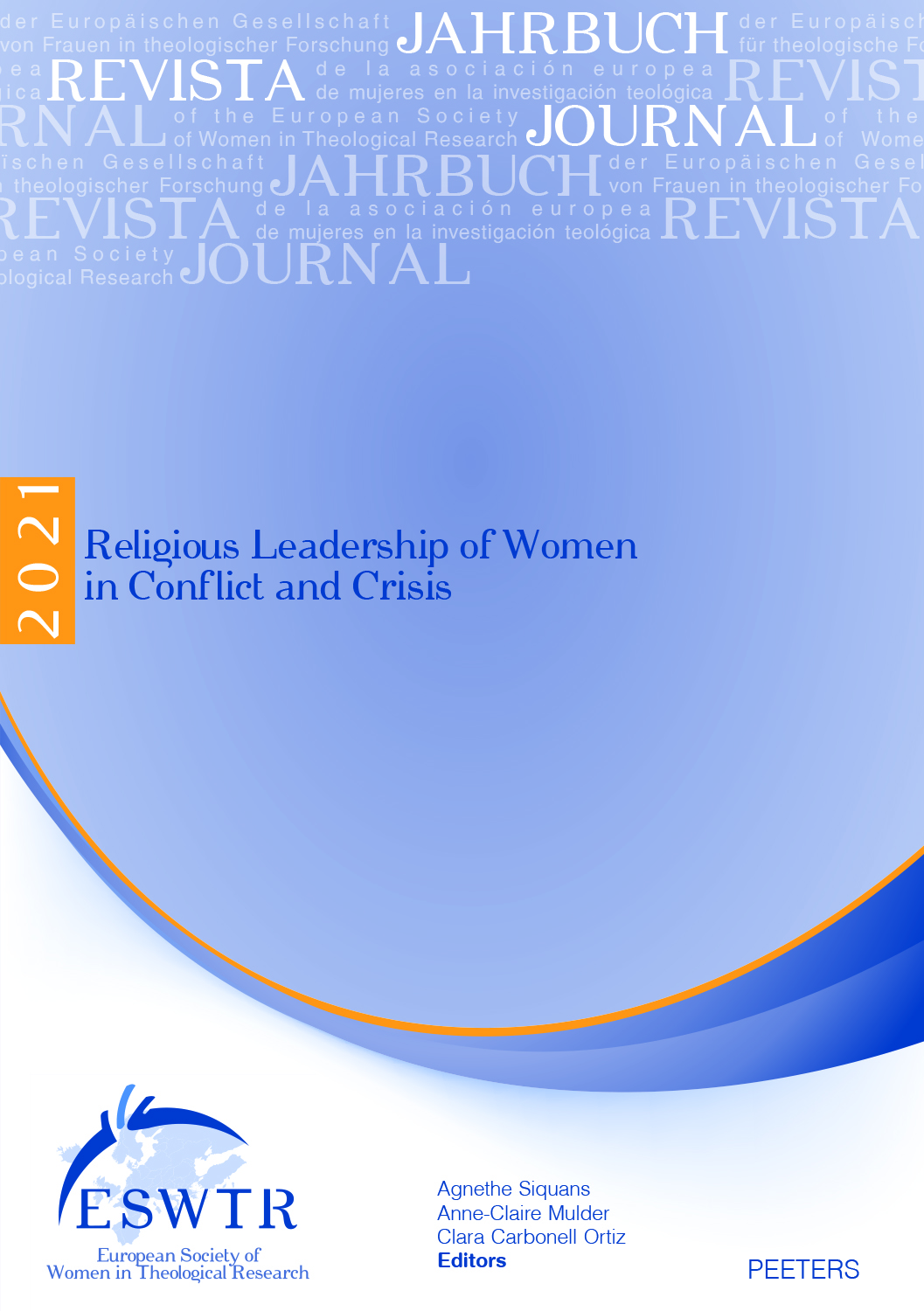 previous article in this issue previous article in this issue | next article in this issue  |

Preview first page |
Document Details : Title: Feminismos populares y luchas migrantes, nuevos escenarios de la Teología feminista en Europa Author(s): TORRES PÉREZ, María José Journal: Journal of the European Society of Women in Theological Research Volume: 20 Date: 2012 Pages: 173-190 DOI: 10.2143/ESWTR.20.0.2959620 Abstract : Referirnos hoy al feminismo o la teología feminista en Europa pasa por hacerlo desde la casa de la diferencia en la luche de las mujeres contra el patriarcado y la desigualdad. Las experiencias de las mujeres son siempre experiencias situadas. Las luchas de las mujeres sin papeles por la ciudadanía, las de las trabajadoras domésticas contra las cadenas globales de cuidado y la explotación e invisibilización de su trabajo, la organización de las trabajadoras sexuales y la reivindicación de sus derechos desde un discurso propio no moralizante, representan algunos aspectos emergentes de estos feminismos en y desde la fronteras y nos urgen a revisar esquemas etnocéntricos, estereotipos y representaciones sociales en los que encerramos a otras mujeres, sin las cuales no es posible el femninismo. Los muros entre las mujeres inmigrantes y las autóctonas, ek 'ellas y el nosotras' se levantan interesadamente por el patriarcado neoliberal en aras a seguir manteniendo la hegemonía postcolonial y lo hace a través de cuatro fronteras simbólicas tremendamente eficaces: las fronteras procreativas, las fronteras étnico-culturales, las fronteras sexuales y las fronteras reproductivas. Nos urge romper la dicotomía nosotras/otras y cruzar las diferencias. Necesitamos hacer teologías feministas desde las plazas y las calles (Sab 6, 14.16) (Ap 22,2). La teología feminista tiene también vocación popular, emerge del cruce cotidiano vital, conviviente de mujeres distintas en nuestra lucha por la vida. La teología necesita bajar a la existencia concreta e irrumpir en la danza de la vida. Narración de dos experiencias concretas: – Los movimientos y luchas mestizas por el reconocimiento de la plena ciudadanía representada por el slogan 'papeles para todas o todas sin papeles' y los derechos de las empleadas de hogar en España: El colectivo 'Territorio Doméstico'; – Los ritos feministas en su doble modalidad: ciudadana e inter-espiritual. Speaking today about feminism or feminist theology in Europe means speaking from the house of difference in the struggle of women against patriarchy and inequality. The experiences of women are always contextualized. The struggles of undocumented women for citizenship, those of household workers against the global chains of care and the exploitation and invisibilizaion of their work, the organization of sexual workers and the claim for their rights from their own non-moralizing discourse, are some emerging aspects of these feminisms at and from the borders which urge us to check ethnocentric preconceptions, stereotypes and social representations where we lock other women in, women without whom feminism is no longer possible. The walls between migrant and native women, that 'them and us', are risen selfishly by neoliberal patriarchy in order to keep post-colonial hegemony through four symbolic borders frightfully effective: procreative borders, ethnic-cultural borders, sexual borders and reproductive borders. It is urgent to break the dichotomy 'we/other' and cross differences. The feminist theologies that we need are to be made from market places and streets (Ecc 6, 14.16) (Rev 22,2). Feminist theology has a popular vocation too, it emerges from everyday crossroads, from life-sharing of different women in a common struggle for life. Theology needs to descend to the specific existence and burst into the dance of life. Narrative of two particular experiences: – The crossbred movements and struggles for the recognition of full citizenship represented by the slogan 'Papers (documents) For All Or All Without Papers' and the rights of household workers in Spain: The Territorio Doméstico group. – The feminist rites in their two ways: citizen and inter-spiritual. Heute über Feminismus oder feministische Theologie in Europa zu sprechen, bedeutet vom Haus der Differenz her im Kampf der Frauen gegen Patriarchat und Ungleichheit zu sprechen. Die Erfahrungen von Frauen sind immer kontextuell. Die Kämpfe von Frauen ohne Papiere um die Staatsbürgerschaft, von Haushaltsangestellten gegen die globale Pflegeketten und die Ausbeutung und Unsichtbarmachung ihrer Arbeit, die Organisierung von Sexarbeiterinnen und ihr Anspruch auf Rechte aus ihrem eigenen, nichtmoralisierenden Diskurs, sind einige Beispiele dieser Feminismen an und von den Grenzen, die uns dazu auffordern, ethnozentrische Vorannahmen, Stereotypen und soziale Repräsentationen zu überdenken, durch die wir andere Frauen eingrenzen, Frauen, ohne die Feminismus nicht länger möglich ist. Die Mauern zwischen Migrantinnen und eingeborenen Frauen, dieses 'sie und wir', werden selbstsüchtig vom neoliberalen Patriarchat erhoben, um postkoloniale Hegemonie durch vier symbolische Grenzen erschreckend effektiv aufrechtzuerhalten: prokreative Grenzen, ethnisch-kulturelle Grenzen, sexuelle Grenzen und reproduktive Grenzen. Es ist daher dringend notwendig, die Dichotomie von 'wir/andere' aufzubrechen und Differenzen zu überwinden. Die feministische Theologie, die wir brauchen, entsteht in den Marktplätzen und Straßen (Weish 6,14.16) (Offb 22,2). Feministische Theologie hat auch eine öffentliche Berufung, sie entsteht an den täglichen Wegkreuzungen, aus dem Teilen des Lebens unterschiedlicher Frauen in ihrem gemeinsamen Kampf ums Leben. Theologie muss in die spezifische Existenz hinabsteigen und in den Tanz des Lebens ausbrechen. Erzählung zweier bestimmter Erfahrungen: – Die vermischten Bewegungen und Anstrengungen für die Anerkennung voller Staatsbürgerschaft, wie sie im Slogan 'Papiere für alle ohne Papiere' zum Ausdruck kommt, und um die Rechte der Hausangestellten in Spanien: Die Gruppe Territorio Doméstico. – Feministische Rituale in zweierlei Ausprägung: bürgerlich und inter-spirituell. |
 |


